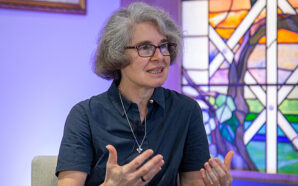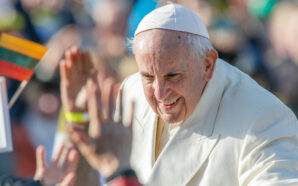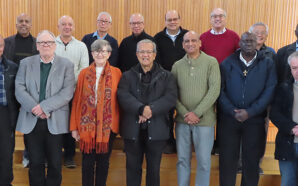Every year at Easter, I can only marvel at the great gift of Jesus’ resurrection and how our risen Lord is able to transform our lives in his gentle and loving way. Until a few years ago, I only saw this mystery at work in the lives of us humans. However, I have come to learn that the resurrection transforms not just the fate of humanity, but of God’s entire creation, the whole cosmos.
This very idea is neither my own, nor a new insight of contemporary theology. It is as old as the Church and can be traced back to the gospels. As ecological and environmental theologies and spiritualities grapple with the various environmental crises of our time (climate change, species extinction, etc.), they rediscover how the risen Christ is at work at the heart of God’s creation.
“For God so loved the world that he gave his only Son … Indeed, God did not send the Son into the world to condemn the world but in order that the world might be saved through him.” – (John 3:16-17, NRSVUE)
According to the Gospel of John, God’s eternal Word, God’s Son, becomes incarnate in Jesus of Nazareth to save the entire world (in ancient Greek: kósmos), including but by no means limited to humankind. This is the same Son who plays a crucial role in the creation of the world, through whom all things come into being in the power of the Holy Spirit:
“In the beginning was the Word, and the Word was with God, and the Word was God. He was in the beginning with God. All things came into being through him, and without him not one thing came into being.” (John 1:1-4, NRSVUE)
This is an early expression of the Christian belief that, while we typically call God the Father the “Creator”, creation is a work of the whole Trinity, an extension of the divine love between Father, Son and Holy Spirit.
The late Australian theologian Monsignor Denis Edwards builds on the theology of the great Karl Rahner when he explains that in the incarnation, God does not only lay hold of human bodily existence, but of the entire material world, in all its atoms, molecules and living organisms.[i] The “dynamic creative power of divine being is radically united” not only with the specific human being Jesus of Nazareth, but through Him “with all of creation”.[ii]
In his death, then, Jesus “hands his whole bodily existence” and thus the entire created world “into the mystery of a loving God”.[iii] And finally in the resurrection, “God adopts creaturely reality as God’s own reality”, which Rahner interprets as the embryonic onset of the divinisation of the entire cosmos,[iv] the coming of “a new heaven and a new earth” (Revelation 21:1).
In the resurrection, Jesus becomes “in his very humanity, what he had always been in his [divine] dignity, the innermost centre of creation”.[v] Jesus Christ is “at the heart of Earth’s history, at the heart not only of love and generosity but also of tears, death, defeats, and even sin, as radical mercy, unbounded love, and the promise of life”.[vi]
This means, as Pope Francis explains, that “the creatures of this world no longer appear to us under merely natural guise because the risen One is mysteriously holding them to himself and directing them towards fullness as their end”.[vii]
Such a view of the resurrection, according to which our risen Lord is present to us in even the tiniest part of the world around us, which He gently transforms from within, can give us motivation and hope for one of the greatest tasks humanity has ever faced: healing the damage we have done to our planet and learning to live in harmony with God’s creation.
While this task can seem overwhelming, we can trust that it will lead us into a deeper communion not only with God’s creation but with Jesus Christ himself. And we can trust that our “effort to build a world of justice and ecological integrity” cannot be in vain, as it “will be taken up and transformed in Christ”.[viii]
“At the end, we will find ourselves face to face with the infinite beauty of God (cf. 1 Cor 13:12), and be able to read with admiration and happiness the mystery of the universe, which with us will share in unending plenitude. Even now we are journeying towards the sabbath of eternity, the new Jerusalem, towards our common home in heaven. Jesus says: “I make all things new” (Rev 21:5). Eternal life will be a shared experience of awe, in which each creature, resplendently transfigured, will take its rightful place and have something to give those poor men and women who will have been liberated once and for all.” – Pope Francis, Laudato Si’ , no. 243.
Find out how you can get involved in the care for God’s creation in your local community or the wider Diocese of Parramatta at parracatholic.org/laudatosi
Dr Sebastian Salaske-Lentern is the Peace, Justice and Ecology Coordinator for the Diocese of Parramatta and a member of the Mission Enhancement Team (MET).
A shortened version of this article was originally published in the 2024 Easter | Autumn edition of the Catholic Outlook Magazine. You can read the digital version here or pick up a copy in your local parish.
[i] Cf. Denis Edwards, Jesus and the Cosmos (Homebush: St Pauls, 1991), pp. 81-83.
[ii] Edwards, Jesus and the Cosmos, p. 131.
[iii] Cf. Denis Edwards, Ecology at the Heart of Faith: The Change of Heart That Leads to a New Way of Living on Earth (Maryknoll: Orbis Books, 2006), p. 87.
[iv] ibid.
[v] Edwards, Jesus and the Cosmos, p. 131; direct quote from Karl Rahner, On the Theology of Death, as cited by Edwards.
[vi] Denis Edwards, Partaking of God: Trinity, Evolution, and Ecology (Collegeville, Minnesota: Liturgical Press, 2014), p. 61.
[vii] Pope Francis, Encyclical Letter LAUDATO SI’ of the Holy Father Francis on Care for Our Common Home (Vatican City: Vatican Press, 2015), no. 100.
[viii] Edwards, Ecology at the Heart of Faith, p. 91.








